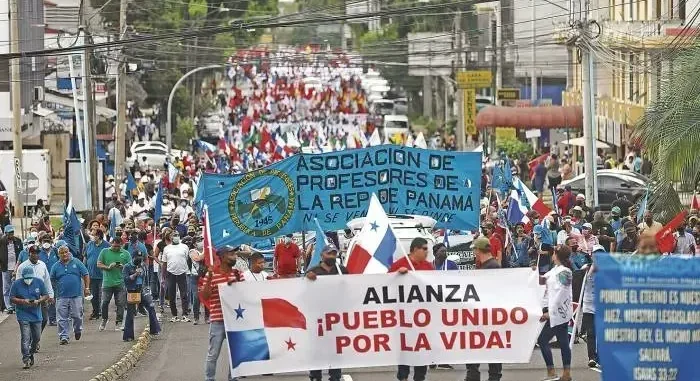
March on July 12, which brought together various unions in protest against the high cost of fuel, food and medicines. Photo: Struggle La Lucha.

Orinoco Tribune – News and opinion pieces about Venezuela and beyond
From Venezuela and made by Venezuelan Chavistas

March on July 12, which brought together various unions in protest against the high cost of fuel, food and medicines. Photo: Struggle La Lucha.
By Olmedo Beluche – Jul 29, 2022
In the last 20 years, Panama has shown macroeconomic figures that the neoliberals love, in particular a sustained growth of the GDP based on private accumulation as a result of the reversion of the canal to Panamanian sovereignty.
But the numbers that make neoliberals happy hide the reality that this country, before the pandemia (2018), was already considered by the World Bank as one of the most unequal in Latin America and the world. According to the ECLAC, as of 2018, twenty percent of the population was below the poverty line, and 10% below the extreme poverty line. All this spurred on by a precariousness of employment that has been going on for 40 years, in which informality exceeded forty percent.
All of which got worse in 2020, due to the economic effects of the pandemia. Private sector wage earners, as of 2019, were 873,750 people, of whom only 30% kept their jobs in the midst of the pandemia; 37% were fired; and 33% (284 thousand) went into a legal limbo called “suspended contracts”. A high percentage of which were reactivated, to be immediately laid off in 2021.
RELATED CONTENT: Struggle for Justice Continues in Panama
Under these circumstances we can understand the degree of discontent of the Panamanian population with the inflation of the fuel, food and medicines’ prices.
Despite the fact that in Panama inflation does not reach extraordinary figures (like in Venezuela or Argentina), and in June 2022 it reached 5.2% compared to the previous year, this increase in prices drives families to despair given the job and salary insecurity.
The Chamber of Commerce demands that the government contain public spending, along layoffs and austerity. The government of Laurentino Cortizo, without admitting the high degree of corruption that corrodes it, has accepted part of the business sector argument and has decided to contain spending with a 10% reduction in the state payroll, which could mean the dismissal of up to 27,000 employees, which would add to the already serious employment crisis.
On the contrary, popular organizations, such as Polo Ciudadano, and the most advanced unions, have pointed out that the central problem of the public administration and the lack of resources necessary to cover social spending lies in the high tax evasion to which is added the policy of exonerations that are made to the main areas of the economy. The problem is not subsidies to the poor but subsidies to the rich.
The economist Juan Jované has estimated that tax evasion in Panama, in the decade from 2009 to 2019, totals about 46 billion dollars. This process of unpunished evasion has been growing from an average of 3,000 million dollars per year to reach 6 billion in 2019, where it is estimated to remain.
RELATED CONTENT: Panama: Dialogue Round-Table Achieves First Agreements
Add to this the policy of tax exemptions and you see a paradise for big business and hell for the working classes. What’s more, the reduction in fuels that is being demanded will become a subsidy for the monopolies that control their importation and distribution, without any control over excessive profits.
The historical task is: the construction of a popular and anti-neoliberal alternative political project. That is why the underlying debate is between two national projects:
1- on the one hand, what is proposed by business associations and traditional parties, who only talk about corruption without modifying the social and economic structure of the country, but to impose an austerity that the working class will pay for;
2- on the other hand, what the popular movement proposes are measures that solve the underlying structural problem, starting with a progressive tax reform in which those who earn the most pay more taxes and that tax evasion is ended and penalized, to begin with. Changing the economic model requires changing the oligarchic and corrupt political regime through a new Constituent Assembly.
Olmedo Beluche is a Panamanian sociologist, professor in the University of Panamá and member of the political organization Polo Ciudadano.